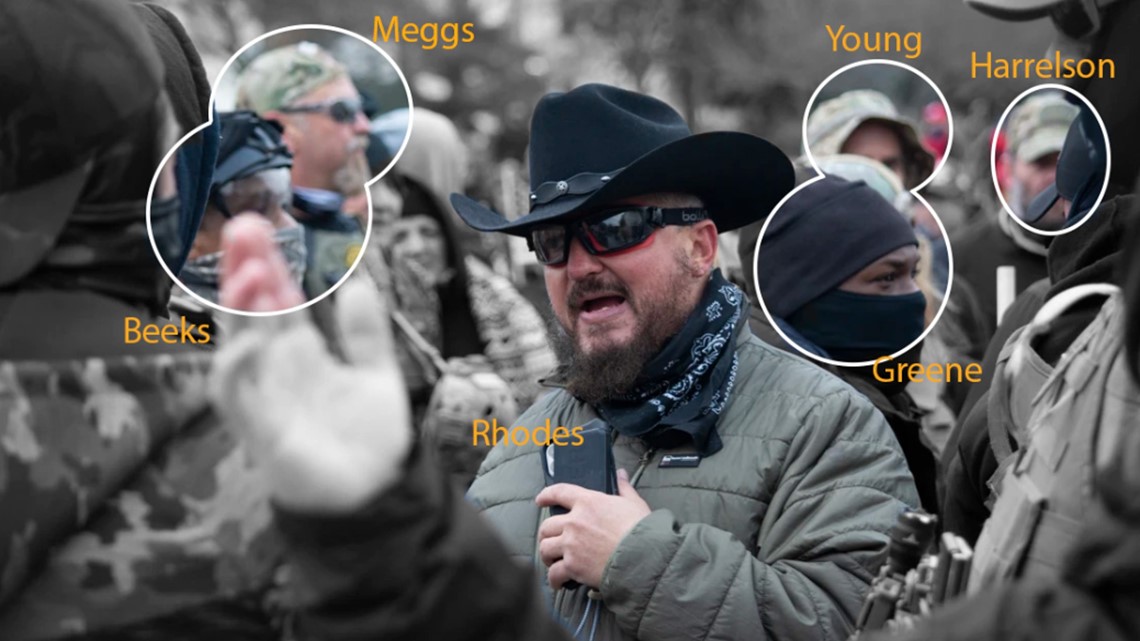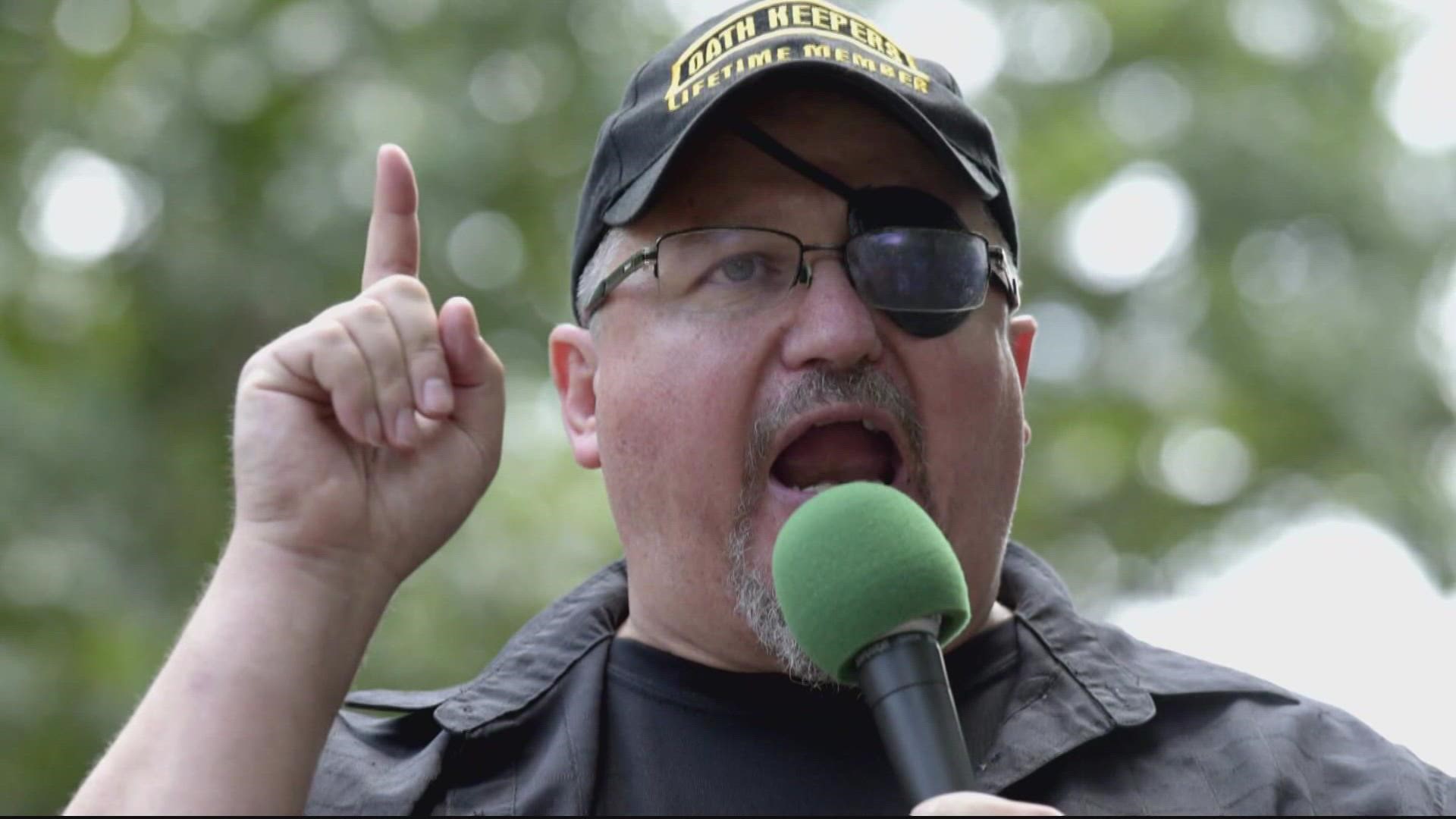WASHINGTON — A federal judge sentenced the Oath Keepers’ Jan. 6 operations leader to two years of probation and a period of community service Friday, saying a jury's decision to acquit him of multiple felony counts had to be respected.
Michael “Whip” Greene, of Indianapolis, was acquitted by a jury in March of two counts of conspiracy and one count of tampering with evidence. Jurors hung on a remaining felony count of obstruction of an official proceeding, which prosecutors later announced they would not retry, and ultimately convicted Greene of only a single count of unlawfully entering and remaining on Capitol grounds.
Greene, a veteran U.S. Army combat engineer and former Blackwater contractor, was brought in just days before Jan. 6 by Oath Keepers founder Stewart Rhodes to be the militia’s operations leader. He testified twice, at Rhodes’ trial and his own, that his job was to organize security details for VIPs and denied any knowledge of a plan for the militia to obstruct the joint session of Congress.


The jury’s verdict was a vindication for Greene and his attorneys, Britt Redden and William Shipley, and marked the first time in three consecutive Jan. 6 conspiracy trials prosecutors had failed to secure a conviction against a defendant on at least one felony count. Since then, another Oath Keeper defendant, Broadway actor James Beeks, was acquitted on all counts in a stipulated bench trial before U.S. District Judge Amit P. Mehta.
On Friday, Mehta said there was an "absence of mens rea evidence" — or evidence of criminal intent — for Greene and he believed that was why the jury decided not to convict.
"That's not to say the government didn't have evidence, but it was far too circumstantial and it did not convince the same group of 12 people who convicted five other defendants in the same trial," Mehta said. "And that has to be respected."
Mehta ordered Greene to serve two years on probation and complete 60 hours of community service. Greene will also continue under a restriction preventing him from keeping firearms in his home for the time being.
Despite his acquittal on most charges and the Justice Department’s decision not to retry him on one remaining felony count, prosecutors had asked Mehta to sentence him to the maximum allowable prison term – 1 year – for serving as what they described in a sentencing memo as one of Rhodes’ “top deputies” in the conspiracy. Prosecutors cited a 1997 Supreme Court case, United States v. Watts, that allows judges to consider acquitted conduct at sentencing under a lower, preponderance of the evidence standard. Jurors are required to find defendants guilty under the higher, beyond a reasonable doubt standard.
In their memo, prosecutors argued Greene must have been privy to Rhodes’ goals and plans and that, despite the jury’s verdict, he should be viewed as a full member of the conspiracy, writing that he had “summoned his co-conspirators to the Capitol and greenlighted their participation in the attack.” On Friday, Assistant U.S. Attorney Alexandra Hughes said the government believed Greene had joined Rhodes "not as an ideologue... but more of a mercenary." She argued his almost complete lack of participation in the militia's planning chats on the Signal messaging app was evidence of how methodical he had been.
"From the government's perspective, Mr. Greene was a very careful criminal and a very careful leader of this conspiracy," she said.
Greene's attorney, Shipley, argued Friday the government should have used that as its closing argument — since the one it presented at trial failed to secure a conviction.
"The government really made Mr. Greene the focus of the third trial he said. "It focused on his leadership and his position on that [poster board] they made, and it didn't carry the day. It didn't carry the day."
In his own memo asking for probation, Shipley argued Greene was only indicted in an effort to prevent him from testifying as a defense witness for the Oath Keepers – which, ultimately, he did anyway.
“Questions remain as to whether Mr. Greene would have ever been indicted had it not been for the fact that he agreed to testify on behalf of Rhodes and other members of the Oath Keepers only three months ahead of the start of the first trial,” Shipley wrote.
Greene spoke briefly in court on Friday, telling Mehta he was stilled listed as a security contractor for the Department of Homeland Security and denying he was a "mercenary" as the DOJ had portrayed him.
"My only crime is working for an organization of white people who higher-end white people consider to be unfavorable white people," Greene told WUSA9 on Friday after the verdict was read.
"I was paid to do a job, I came to do the job and I went home," he added.
Despite Greene’s testimony, Rhodes and four co-defendants were convicted in the first trial on multiple charges each. Rhodes and former Florida Oath Keepers state leader Kelly Meggs were each found guilty of seditious conspiracy and sentenced to 18 and 12 years in prison, respectively. To date, nearly two dozen members of the Oath Keepers militia have pleaded guilty or been convicted at trial of charges ranging from evidence tampering to conspiring against the government. Charges remain pending against one indicted co-defendant, former Oath Keepers general counsel Kellye SoRelle, after Mehta’s ruling last month finding her incompetent to stand trial.

